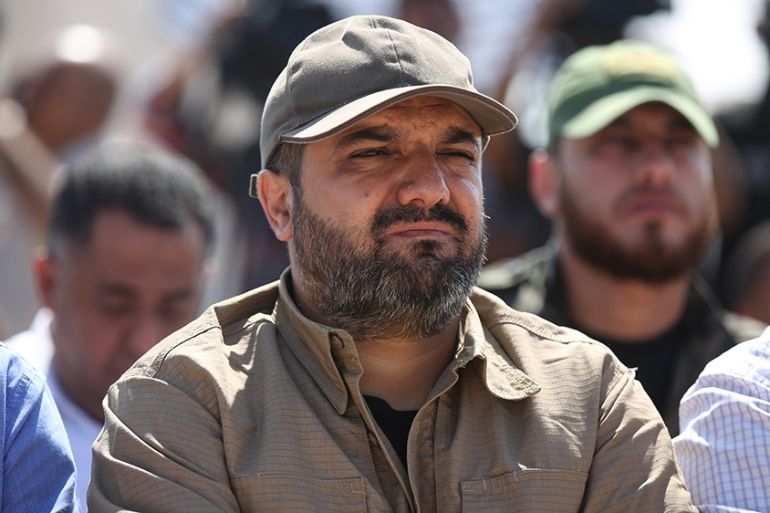What was behind the latest escalation in Gaza?
Israel’s killing of an Islamic Jihad commander last month sparked two days of fighting in the coastal enclave.

Gaza City – After the Palestinian Islamic Jihad commander Bahaa Abu al-Ata was killed in an Israeli air raid on the besieged Gaza Strip last month, Hamas and Islamic Jihad appeared to measure their responses in order to prevent an all-out war.
Both Hamas, which controls the coastal territory, and the much smaller Islamic Jihad group have small armies, as well as arsenals of rockets and missiles capable of reaching deep into Israel. While Hamas also administers the territory, Islamic Jihad does not engage in Palestinian electoral politics.
Keep reading
list of 4 itemsNSM-20: ‘Inconsistencies’ plague US assessment on Israel’s Gaza war conduct
Israel’s war on Gaza updates: Ground assaults intensify in north and south
South Africa asks ICJ to order Israel to withdraw from Gaza’s Rafah
During the two days of fighting that followed the killing of Abu al-Ata, Islamic Jihad launched hundreds of rockets towards Israel, which carried out a number of air raids that killed 34 Palestinians, including nine members of a single family, all of whom were civilians.
The latest flare-up was the most serious escalation in fighting since 2014, when Palestinian armed factions and Israel fought a seven-week war in which more than 2,100 Palestinians were killed, including more than 1,400 civilians, while 66 Israeli soldiers and four civilians were killed.
It was the third time Israel launched a war in Gaza since Hamas took control of the enclave in 2006, after which Israel and Egypt imposed a crippling land, sea and air blockade on Gaza.
A marked man
Dawood Shihab, a senior Islamic Jihad official in Gaza, told Al Jazeera that the organisation’s leadership and Abu al-Ata himself believed that Israel would try to kill him, after Abu al-Ata repeatedly ordered rocket fire from Gaza towards Israel.
A number of reports appeared in Israeli media outlets hinting at an upcoming attack and Egypt had also warned Islamic Jihad leaders that Abu al-Ata would be targeted, he added.
Shihab, who manages the group’s media relations, said while it did not want to escalate the fighting, it decided to launch rockets at Israel because it had to respond to the killing of a senior military commander.
Hours after Abu al-Ata was killed, as Islamic Jihad fired numerous rockets towards Israel, the group was contacted via the UN by Israel, which called for an immediate ceasefire.
“We did not agree to Israel’s ceasefire demand because we did not want to let Israel feel it can act with impunity when it comes to its bombing of Gaza,” he told Al Jazeera.
But he said Islamic Jihad agreed to Egyptian mediation efforts to stop the fighting in order to save Palestinian lives.
“We are mindful of our civilian casualties that Israel target on purpose, but we could not let Israel commit more crime against us without a retaliation,” he said.
Shihab said his organisation had the capability to strike deeper into Israel, but it did not want to give Israeli Prime Minister Benjamin Netanyahu, who has been indicted on corruption charges and is facing a battle for political survival after two inconclusive elections, a pretext to wage a large scale war in Gaza that could potentially boost his political prospects.

Cairo talks
Most of the Gaza-based Islamic Jihad leadership travelled to the Egyptian capital Cairo this week to discuss Palestinian reconciliation and ceasefire understandings with Israel with Egyptian government officials, Shihab told Al Jazeera.
He also denied an Israeli claim that Rasmi Sawarka, who was killed along with eight members of his family, was a member of the group.
Israel’s military has since said it was investigating the incident and “harm caused to civilians”, while the Haaretz newspaper reported that the Israeli claim Sawarka was a member was based on false rumours.
Hamas stayed out of the fighting between Islamic Jihad and Israel because it did not want to escalate the conflict, said Ghazi al-Hamad, a Hamas minister in Gaza.
“[Hamas] realised early on that if it got involved in the fighting, Gaza and Israel would have gone to war, something Hamas is eager to avoid for the sake of preventing the suffering of our people,” he told Al Jazeera.
Mkhaimer Abusada, a political science professor at al Azhar University in Gaza, told Al Jazeera that “neither Hamas nor the political leadership of the PIJ wanted a military confrontation with Israel.”
‘Lack of discipline’
While Hamas’s military command and control infrastructure, as well as its military commanders and its heavy weapons, are located deep in an underground tunnel network in Gaza, Islamic Jihad does not have a known tunnel network or private communications system.
Abusada said Islamic Jihad’s lack of discipline has often caused violent clashes between its armed individuals in Gaza, as well as with Israel, while he also questioned the group’s ability to maintain its internal security.
“It is said in Gaza that the PIJ is the most penetrated by Israeli intelligence of any Palestinian faction,” Abusada said, adding that Abu al-Ata was perceived within military and political circles in Gaza as an “undisciplined” and “reckless” commander who caused unnecessary skirmishes with Israel.
Abusada said that Hamas allowed Islamic Jihad to engage in a limited military retaliation after Abu al-Ata’s killing in order to give the group the chance to respond.
“Hamas did not intervene militarily, but it at least it did not tie Islamic Jihad’s hands when it retaliated against Israel,” Shihab said.
Abusada argued that Netanyahu’s precarious political position meant there was a heightened risk that the Israeli prime minister would attack Gaza.
“But as the governing authority in Gaza, Hamas has an interest to keep the situation under control and deny Netanyahu an opportunity to wage an all-out war with Gaza,” he said.
Journalist Safa al-Habeel contributed to this report from Gaza
Follow Ali Younes on Twitter @Ali_reports